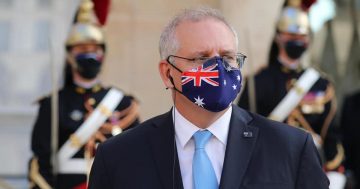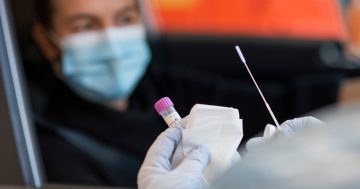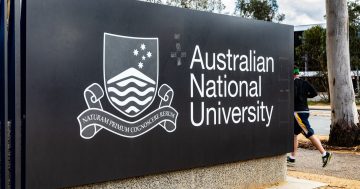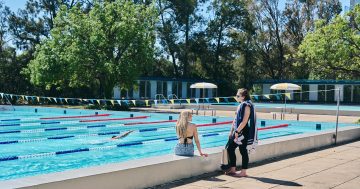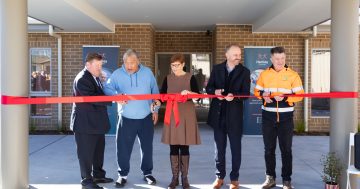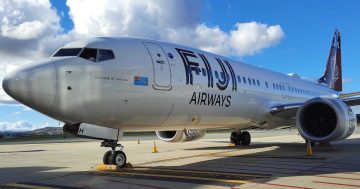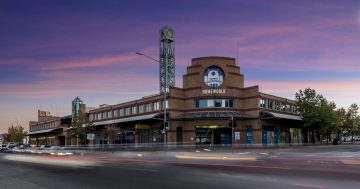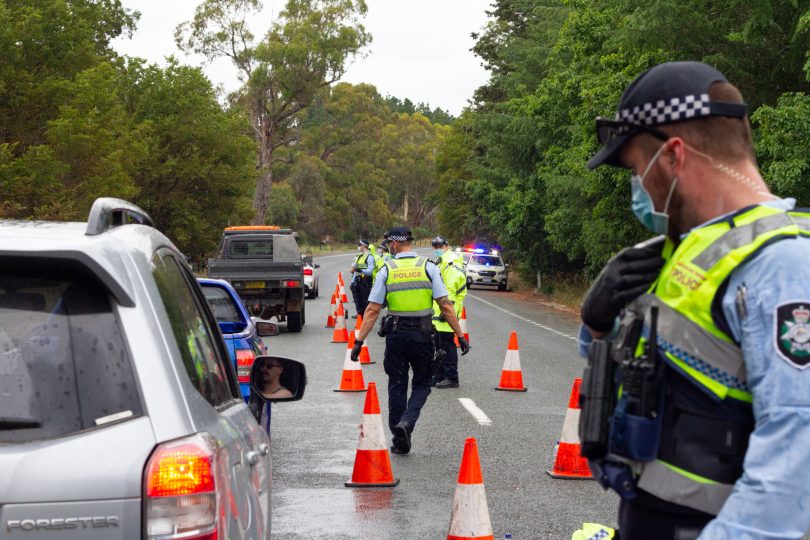
ACT Policing has set up roadblocks to ensure compliance with the new health direction. Photo: Dominic Giannini.
The public health direction imposing restrictions on entering the ACT for non-residents and those who have visited COVID-19 hotspots in NSW has been extended for at least another week.
Chief Health Officer Dy Kerryn Coleman said the restrictions would remain in place while community transmission and the potential seeding of the virus outside hotspot areas remained a concern.
A person can be fined up to $8,000 for breaching the public health direction.
ACT Policing will ramp up COVID-19 compliance operations across the ACT to ensure that no one who has visited a hotspot is trying to flout the rules. This includes border checkpoints along the Federal Highway and Sutton Road in Pialligo, as well as random stops on cars with NSW number plates across the city.
Only local traffic, including residents of Wamboin and Bywong, is allowed through the Sutton Road checkpoint, ACT Policing confirmed.
FAQs
- I am an ACT resident, what do the new restrictions mean for me?
- I live just over the border, can I still enter the ACT? Do I need a permit?
- I need to quarantine, what now?
- I was planning to travel to the South Coast, can I still go?
- What about interstate travel?
ACT residents who have not travelled to a hotspot can essentially carry on their lives as before, subject to the usual COVID-19 restrictions across the city.
Residents returning from any hotspot – which are currently the Northern Beaches, Greater Sydney, Central Coast and Wollongong areas – will need to enter 14 days of quarantine upon arriving in the ACT. They will also need to fill out an ACT Health online declaration form.
Living in the Canberra region
People who live just over the border can still enter and exit the ACT as they usually would but may be subject to checks from ACT Policing at a roadblock or random stop.
If you reside in Queanbeyan, Jerrabomberra, Yass, Murrumbateman, Goulburn or any other surrounding area, you will not need a permit, nor will any be granted for express lanes through checkpoints, Mr Barr confirmed.
“We do not want these checkpoints to have to be in place a day longer than necessary … This is not a hard border closure. The ACT is not closed to NSW,” Mr Barr said.
Apart from the inconvenience of added traffic or delays, there are no changes to the restrictions already imposed. Changes only impact non-residents who live in or have visited a hotspot. They are now banned from entering the ACT instead of being allowed to undergo a mandatory quarantine period here.
However, exemptions in extreme circumstances may be granted. This includes people moving to the ACT, but they will still need to quarantine in their new house upon arrival.
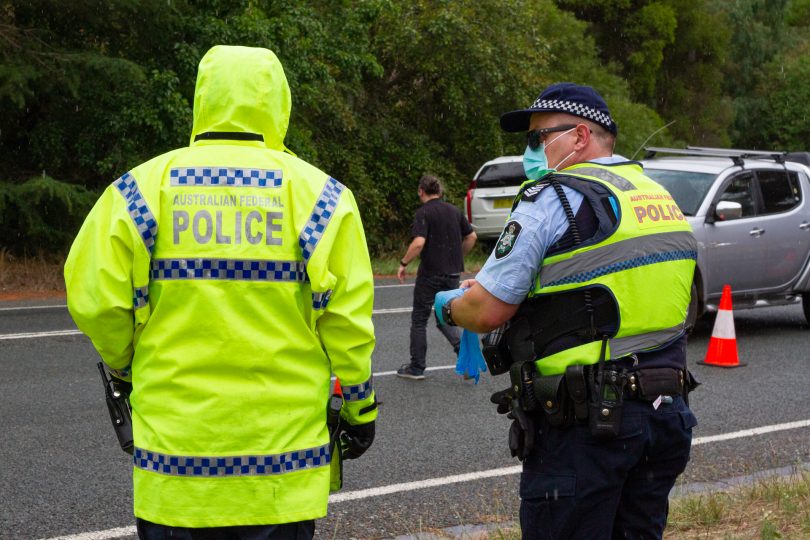
AFP COVID-19 border checks yesterday. Photo: Dominic Giannini.
Quarantining
People in quarantine cannot leave their house or come into contact with anyone they are not quarantining with. This includes leaving the house for solo exercise. People in quarantine can leave their house to attend essential medical appointments or seek emergency medical help.
Testing is encouraged upon entering quarantine and around day 12 before exiting quarantine.
ACT Policing will be conducting compliance checks to ensure people remain in quarantine as mandated.
South Coast holiday?
At the moment, Canberrans are still allowed to travel to the South Coast and return without needing to quarantine. However, this may change will little notice if a hotspot area is identified or restrictions expanded.
Keep up to date at covid19.act.gov.au and ACT Health social media pages.
Interstate borders
Restrictions imposed on NSW by other states have resulted in confusion and miscommunication after ACT residents experienced an inconsistent approach when trying to enter Victoria over the New Year period.
Mr Barr said the situation was regrettable but it will always be the case that new restrictions will come into place before everyone is aware of them or understand them.
“We will endeavour to work with the Victorians to get [ACT residents] home,” he said.
“The best advice we can give is that travel arrangements are going to change and that most people will find themselves if they are travelling, and particularly across multiple state borders, potentially with a bit of difficulty.
“Ultimately the rules in Victoria are set by Victoria.”
Victoria has closed its border to NSW but not the ACT. People travelling through NSW to Victoria will need a Border Crossing Permit from service.vic.gov.au.
However, residents may come into trouble at the border if they have driven through NSW with reports of some people being turned away. For this reason, it is best to avoid driving through NSW to reach Victoria, Mr Barr said.
Travellers will also need to keep up to date with restrictions of the jurisdiction they are travelling to as they can change rapidly.












